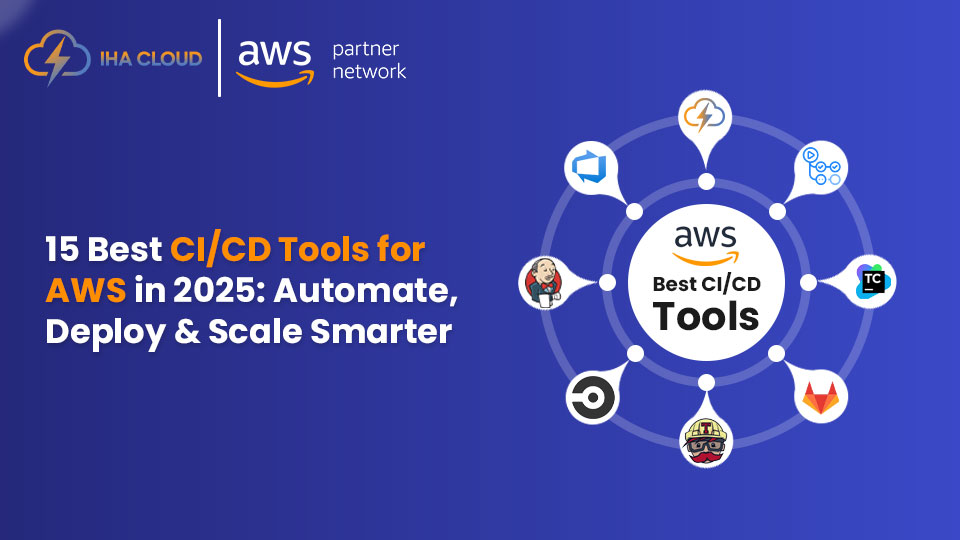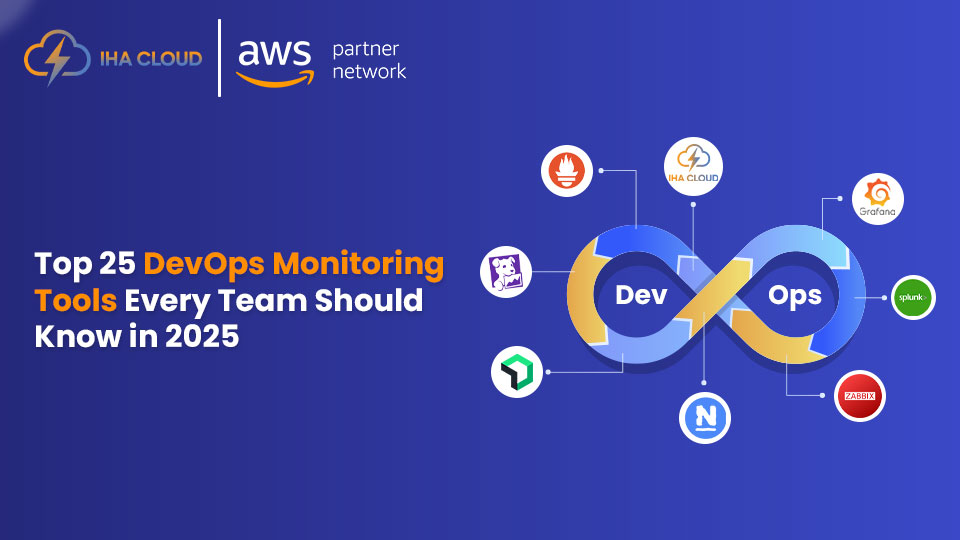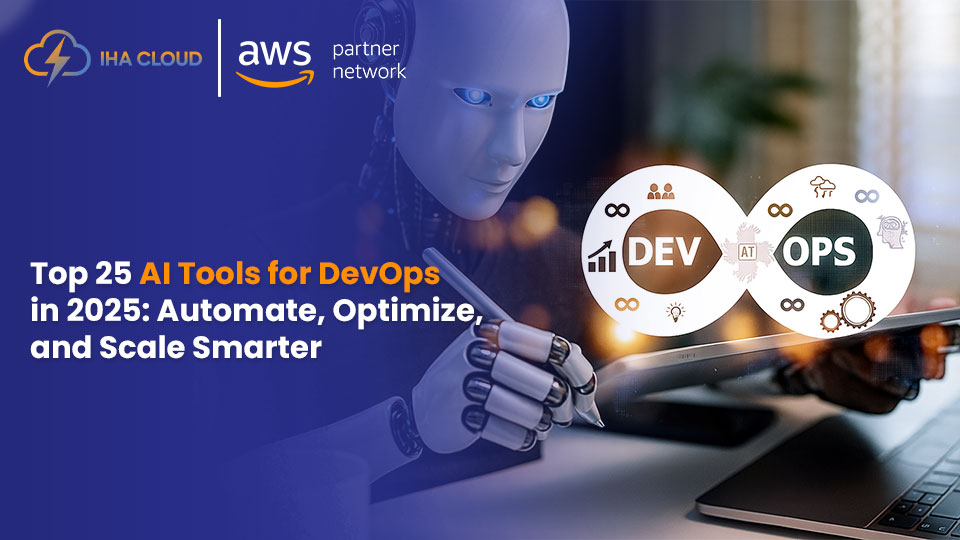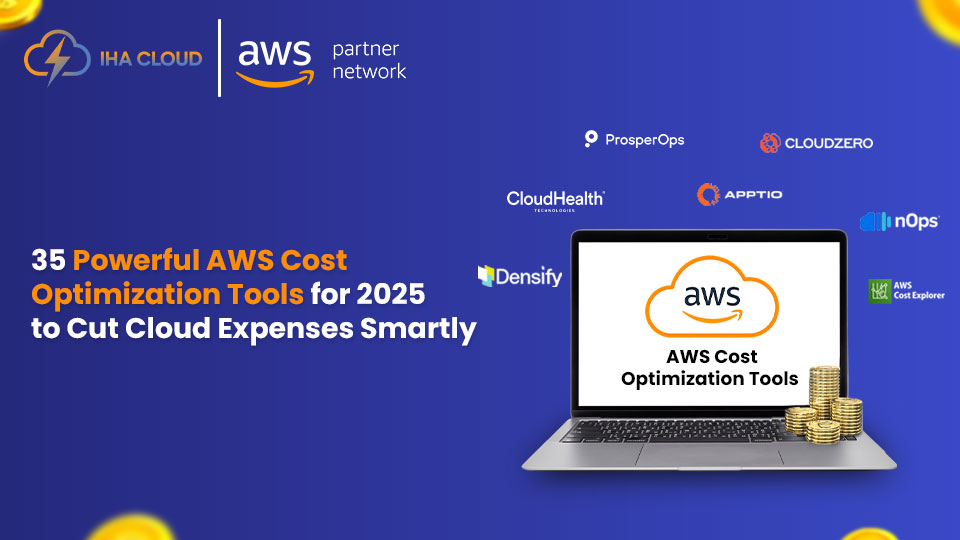In today’s cloud-driven software development world, automation has become the backbone of agility and innovation. Whether you’re managing microservices, deploying containerized apps, or running large-scale enterprise workloads, CI/CD tools for AWS play a critical role in streamlining code delivery and improving reliability.
AWS offers a robust ecosystem for DevOps teams — from native services like CodePipeline, CodeBuild, and CodeDeploy to third-party tools like Jenkins, GitLab CI/CD, and CircleCI — all built to enhance continuous integration and continuous delivery.
The right CI/CD tools for AWS help automate your build, test, and deployment pipelines, minimize manual errors, and ensure faster, more secure software releases. In this blog, we’ll explore the 15 best CI/CD tools for AWS in 2025, each offering unique features, scalability, and integration options to meet your business needs.
What Are CI/CD Tools for AWS?
CI/CD tools for AWS are automation platforms that help developers build, test, and deploy software quickly and efficiently in the cloud. “CI” stands for Continuous Integration, which focuses on automatically merging and testing code changes, while “CD” stands for Continuous Delivery or Deployment, which handles the automatic release of that tested code into production.
These tools are designed to remove manual steps from the software lifecycle. Instead of manually uploading code, running tests, and checking servers, CI/CD pipelines take care of everything — ensuring faster updates, fewer errors, and greater consistency.
When integrated with AWS, these tools connect directly to services like EC2, ECS, Lambda, S3, and CloudFormation, enabling developers to automate the entire release process within Amazon’s secure and scalable environment.
Why Are CI/CD Tools Important for AWS Developers?
In the AWS ecosystem, automation is key to managing complex applications and microservices. CI/CD tools make this process smoother by:
- Reducing Human Error:
Automated builds and tests reduce the risk of mistakes during deployment. - Speeding Up Releases:
Instead of days or weeks, updates can be deployed within minutes. - Improving Collaboration:
Developers, testers, and DevOps teams work together more efficiently using shared pipelines and automated feedback loops. - Ensuring Consistency:
Every code release follows the same repeatable process — ensuring uniform performance across all environments. - Saving Costs:
Automated workflows reduce manual labor, optimize resources, and minimize downtime during deployments.
How Do CI/CD Tools Work on AWS?
The CI/CD process on AWS generally follows a structured workflow:
- Code Integration:
Developers push their code to a central repository (like Git). Once pushed, the CI tool detects changes and triggers a build. - Build and Test Automation:
The CI/CD system compiles the code, runs unit and integration tests, and ensures everything works before deployment. - Artifact Storage:
Successful builds are packaged and stored — often in AWS S3 or container registries like Amazon ECR. - Automated Deployment:
After testing, the CD pipeline automatically releases the new version to production using AWS services such as EC2, ECS, or Lambda. - Monitoring and Feedback:
The final step includes monitoring application health, error tracking, and rollback in case of failures — ensuring smooth and stable releases.
What to Look for When Choosing CI/CD Tools for AWS
When selecting the right CI/CD tool, it’s important to focus on key capabilities that align with your team’s workflow and infrastructure. Here are the top factors to consider:
- AWS Integration: Ensure the tool connects seamlessly with EC2, Lambda, CloudFormation, or S3 for streamlined automation.
- Ease of Use: Choose a tool with an intuitive interface and YAML or visual pipelines for simple configuration.
- Scalability: Your tool should handle multiple pipelines, large builds, and distributed environments as your project grows.
- Security: Look for AWS IAM integration, secret management, and compliance controls to protect credentials and data.
- Deployment Flexibility: Support for blue-green, rolling, or canary deployments is vital for zero-downtime updates.
- Reporting and Monitoring: Real-time insights help track performance and identify issues before they impact users.
Why AWS Is Ideal for CI/CD Pipelines
AWS offers the most complete environment for building, testing, and deploying modern applications. With services like EC2, S3, EKS, and CloudWatch, developers can create robust CI/CD pipelines that scale automatically, reduce operational costs, and enhance release speed.
AWS also supports multiple development frameworks, programming languages, and DevOps tools, giving teams the freedom to choose what fits best. Whether it’s a startup deploying web apps or an enterprise managing global workloads, AWS provides the infrastructure reliability and automation power needed for smooth continuous delivery.
The Future of CI/CD on AWS
As businesses move toward microservices, containers, and AI-driven development, CI/CD tools for AWS are evolving rapidly. The future will bring smarter pipelines powered by machine learning, predictive analytics, and self-healing automation that can detect failures before they occur.
Serverless CI/CD, edge deployments, and GitOps models are also becoming more popular, allowing developers to focus on innovation rather than infrastructure management. In short, CI/CD on AWS is moving from simple automation to intelligent orchestration — where every release is faster, safer, and more reliable.
Comparison table: 15 best CI/CD tools for AWS in 2025
| # | Tool Name | Key AWS Integration / Features | Best Suited For / Use Case |
|---|---|---|---|
| 1 | AWS CodePipeline | Native integration with CodeBuild, CodeDeploy, CloudFormation, Lambda; supports approvals & triggers | Teams fully in AWS looking for managed, end-to-end CI/CD |
| 2 | Jenkins | Plugins for AWS EC2, S3, CodeDeploy, Lambda; supports agents on AWS | Custom pipelines with full control and plugin support |
| 3 | GitLab CI/CD | Deploy to EC2, ECS, Lambda; container registry, security scanning | Teams using GitLab for both SCM and CI/CD |
| 4 | CircleCI | AWS integrations (ECS, ECR, Lambda), Docker support, caching | High-performance CI/CD with fast builds |
| 5 | Travis CI | Direct deploy to S3, EC2, Lambda; multi-language support | Open source / small teams wanting hosted CI/CD |
| 6 | Bitbucket Pipelines | IAM / role integration for AWS, deploy to EC2, ECS, Lambda | Teams already using Bitbucket / Atlassian stack |
| 7 | GitHub Actions | Marketplace AWS actions, secrets for AWS credentials, deploy to AWS services | GitHub users wanting native CI/CD |
| 8 | AWS CodeBuild | Fully managed build service, deep AWS integration (S3, IAM, CloudWatch) | Serverless build automation within AWS pipelines |
| 9 | Spinnaker | Native support for EC2, ECS, Lambda; sophisticated deployment strategies | Enterprises handling complex multi-environment deployments |
| 10 | TeamCity | AWS plugin support (CodeDeploy, EC2, S3), distributed agents | Enterprise teams needing robust, customizable builds |
| 11 | Bamboo | Integration with AWS CodeDeploy, EC2, S3 | Teams already using Jira / Atlassian tools |
| 12 | Buddy | AWS actions for Lambda, EC2, ECS, Beanstalk; drag & drop pipelines | Mid-sized teams seeking simplicity with AWS deployment |
| 13 | Harness | AI-based verification, AWS cost reporting, blue/green & canary support | Enterprises focused on safe, automated deployments |
| 14 | Codefresh | Kubernetes + AWS EKS / ECS support, GitOps, container pipelines | Teams using containers / Kubernetes in AWS |
| 15 | AWS CodeDeploy | Deploys to EC2, Lambda, on-prem, supports blue/green & rolling updates | Teams wanting managed, flexible deployment automation |
Here is the detailed description about the best CI/CD tools for AWS in 2025
1. AWS CodePipeline
AWS CodePipeline is Amazon’s native continuous integration and continuous delivery service designed to automate the release process for fast and reliable application updates. It integrates seamlessly with other AWS services like CodeBuild, CodeDeploy, CloudFormation, and Lambda, making it ideal for teams already in the AWS ecosystem.
Key Features:
- Fully managed, eliminating the need for manual infrastructure setup.
- Integration with GitHub, Bitbucket, Jenkins, and other source control tools.
- Real-time monitoring and notifications through CloudWatch and SNS.
- Supports both manual and automated approvals within pipelines.
- Scalable and pay-as-you-go pricing model.
Why Use It:
AWS CodePipeline reduces release cycles and improves deployment speed by automating every stage of your software delivery process—from code commit to production deployment—directly within AWS.
2. Jenkins
Jenkins remains one of the most popular open-source CI/CD automation servers and works perfectly with AWS environments. With hundreds of plugins, it allows developers to build, test, and deploy applications across EC2, ECS, Lambda, or EKS.
Key Features:
- Huge plugin ecosystem for AWS integration and third-party tools.
- Supports containerized builds using Docker or Kubernetes.
- Scalable via distributed build agents (nodes).
- Integrates with AWS CodeDeploy, S3, and CloudFormation.
- Community-driven and highly customizable.
Why Use It:
Jenkins is ideal for teams needing complete control and flexibility over their build and deployment pipelines. When paired with AWS infrastructure, it becomes a powerful automation engine for cloud-native projects.
3. GitLab CI/CD
GitLab CI/CD offers a built-in pipeline solution for version control, testing, and deployment directly from the GitLab environment. It integrates easily with AWS services, enabling developers to deploy applications on EC2 instances, ECS clusters, or Lambda functions.
Key Features:
- YAML-based configuration for pipeline definitions.
- Auto DevOps features for automated builds and deployments.
- Seamless integration with AWS Elastic Beanstalk, S3, and CloudFront.
- Built-in container registry and security scanning tools.
- Scalable runners for distributed workloads.
Why Use It:
GitLab CI/CD provides an all-in-one DevOps solution—from source control to deployment—making it a great choice for AWS developers who want to simplify their workflow without juggling multiple tools.
4. CircleCI
CircleCI is a high-performance CI/CD platform that offers deep integration with AWS services, allowing teams to build, test, and deploy applications at scale. Known for its flexibility and speed, CircleCI helps automate complex delivery pipelines across different environments.
Key Features:
- Pre-built integrations with AWS Lambda, ECS, and ECR.
- Supports parallelism to run multiple tests simultaneously.
- Advanced caching and reusable configurations for faster builds.
- Compatibility with Docker, Kubernetes, and Terraform.
- Built-in insights and performance metrics.
Why Use It:
CircleCI is ideal for teams looking for scalable, cloud-native CI/CD with minimal setup. Its strong AWS integration ensures seamless deployments and reduced build times.
5. Travis CI
Travis CI is a popular cloud-based CI/CD service used for testing and deploying code automatically. It integrates easily with AWS, enabling direct deployment to S3, Lambda, Elastic Beanstalk, or EC2.
Key Features:
- Simple YAML-based configuration files.
- Integration with GitHub and Bitbucket for automated build triggers.
- Multi-language support including Python, Ruby, Go, Node.js, and more.
- Encrypted environment variables for secure credential handling.
- Parallel build execution for faster delivery.
Why Use It:
Travis CI is an excellent option for developers looking for an easy-to-use, hosted CI/CD service with smooth AWS deployment capabilities. It’s lightweight, reliable, and ideal for small to mid-sized development teams.
6. Bitbucket Pipelines
Bitbucket Pipelines offers an integrated CI/CD service within Bitbucket Cloud, allowing teams to automate their code from build to deployment without needing external tools. With AWS integrations, developers can deploy applications directly to EC2, ECS, or Lambda.
Key Features:
- Integrated pipeline setup within Bitbucket’s repository UI.
- YAML-based configuration with reusable pipeline templates.
- Secure integration with AWS services through IAM roles and keys.
- Real-time logs and step-based execution.
- Seamless collaboration with Jira and Confluence.
Why Use It:
Bitbucket Pipelines is perfect for teams already using Atlassian tools. Its simplicity, coupled with AWS integration, makes it a convenient choice for end-to-end cloud deployments.
7. GitHub Actions
GitHub Actions provides a native CI/CD solution built right into GitHub repositories. It lets developers automate workflows for building, testing, and deploying applications to AWS environments directly from their codebase.
Key Features:
- YAML-based workflow definitions triggered by GitHub events.
- Ready-to-use AWS integrations and marketplace actions (for EC2, S3, ECS, etc.).
- Built-in secrets management for secure AWS credentials.
- Support for containerized builds and matrix testing.
- Scalable runners (hosted or self-hosted).
Why Use It:
GitHub Actions is a great choice for teams that already host their code on GitHub. It simplifies the CI/CD process by keeping everything — from source control to deployment — in a single platform with strong AWS compatibility.
8. AWS CodeBuild
AWS CodeBuild is a fully managed build service by Amazon that compiles source code, runs tests, and produces software packages ready for deployment. It integrates perfectly with AWS CodePipeline and other AWS tools to form a complete CI/CD ecosystem.
Key Features:
- Fully managed — no need to provision or maintain servers.
- Pay-as-you-go pricing based on build minutes.
- Preconfigured build environments or customizable Docker images.
- Deep integration with S3, CloudWatch, and IAM for security and monitoring.
- Auto-scaling based on workload demand.
Why Use It:
AWS CodeBuild is an excellent choice for AWS-native teams that want an easy, serverless build service. It scales automatically, supports multiple programming languages, and ensures quick and efficient builds.
9. Spinnaker
Spinnaker is an open-source multi-cloud continuous delivery platform developed by Netflix. It provides strong AWS integration, allowing enterprises to manage complex deployments with ease and reliability.
Key Features:
- Native support for AWS EC2, ECS, Lambda, and EKS.
- Canary, blue-green, and rolling deployment strategies.
- Advanced pipeline automation and approval stages.
- Role-based access control (RBAC) and audit trails for governance.
- Integration with Jenkins, GitHub, and other CI tools.
Why Use It:
Spinnaker is perfect for large-scale enterprises using AWS for multi-environment deployments. It provides granular control over release strategies and ensures reliability for mission-critical applications.
10. TeamCity
Developed by JetBrains, TeamCity is a powerful CI/CD server known for its flexibility, scalability, and deep integrations with cloud providers like AWS. It supports complex build pipelines and advanced automation workflows, making it ideal for enterprise development teams.
Key Features:
- Pre-configured integrations with AWS EC2, S3, and CodeDeploy.
- Parallel build execution and build-chain visualization.
- Comprehensive plugin ecosystem for custom workflows.
- Built-in build history tracking, test analysis, and reporting.
- Support for Docker and Kubernetes deployments.
Why Use It:
TeamCity offers exceptional customization and control, perfect for teams that require a mix of on-premises and AWS cloud environments. Its real-time build monitoring and advanced deployment options make it a reliable CI/CD platform for large organizations.
11. Bamboo
Bamboo, developed by Atlassian, is a powerful CI/CD tool that integrates seamlessly with Jira, Bitbucket, and AWS. It helps automate the build, test, and release process while maintaining tight control over delivery workflows.
Key Features:
- Integration with AWS CodeDeploy, S3, and EC2 for cloud deployments.
- Native support for Docker and Kubernetes containers.
- Built-in testing and environment management.
- Easy traceability through Jira integration.
- On-premise or cloud-hosted flexibility.
Why Use It:
Bamboo is an excellent fit for teams already using Atlassian tools. Its visual pipeline builder and AWS deployment features simplify continuous delivery while maintaining security and transparency.
12. Buddy
Buddy is a modern CI/CD platform designed for simplicity, speed, and automation. It supports more than 150 integrations, including a robust set of AWS deployment actions that allow developers to build and deploy in minutes.
Key Features:
- Drag-and-drop pipeline automation for ease of use.
- Native AWS support (S3, ECS, Lambda, Elastic Beanstalk, CloudFront).
- Pre-built Docker and Kubernetes actions.
- Smart caching for faster builds.
- Real-time deployment monitoring and rollback options.
Why Use It:
Buddy is perfect for small to mid-size teams that prioritize speed and simplicity. Its user-friendly interface and AWS integrations make it an ideal choice for rapid, cloud-based software delivery.
13. Harness
Harness is an intelligent CI/CD platform powered by machine learning that automates the entire software delivery lifecycle. It integrates effortlessly with AWS, enabling secure and optimized deployments across EC2, ECS, Lambda, and EKS.
Key Features:
- AI-powered verification for automated rollback on deployment failures.
- Continuous verification and governance controls.
- Deep AWS integration for cloud cost management and scaling.
- Supports blue-green and canary deployments.
- Built-in security and compliance checks.
Why Use It:
Harness is ideal for enterprises looking to reduce deployment risk while maintaining automation and compliance. Its AI-driven monitoring ensures smoother and safer deployments on AWS.
14. Codefresh
Codefresh is a Kubernetes-native CI/CD solution built for modern cloud applications. It integrates seamlessly with AWS EKS, ECS, and Lambda, offering end-to-end visibility into the delivery pipeline.
Key Features:
- GitOps-based deployment and version control.
- Real-time pipeline visualization and build analytics.
- Integration with AWS cloud-native services and third-party tools.
- Built-in Docker image management and Helm chart support.
- High scalability for microservices and containerized applications.
Why Use It:
Codefresh is an excellent choice for teams adopting Kubernetes and microservices on AWS. Its modern DevOps approach enables faster delivery cycles and higher visibility across deployments.
15. CodeDeploy
AWS CodeDeploy is Amazon’s managed deployment service that automates code releases to various AWS compute services, including EC2, Lambda, and on-premises servers. It integrates perfectly with CodePipeline and other AWS CI/CD tools to create a complete automation ecosystem.
Key Features:
- Automated deployments to EC2, Lambda, or hybrid environments.
- Supports blue-green and rolling updates.
- Real-time monitoring and rollback on failure.
- Tight integration with AWS IAM for security.
- Cost-effective and fully managed by AWS.
Why Use It:
CodeDeploy is best for organizations that want complete automation and consistency in their AWS deployments. It’s reliable, serverless, and simplifies even the most complex release workflows.
Conclusion
Choosing the best CI/CD tools for AWS depends on your organization’s size, technical stack, and DevOps maturity. For startups, lightweight options like Buddy, Bitbucket Pipelines, or GitHub Actions offer simplicity and affordability. For large-scale enterprises, solutions like Spinnaker, Harness, or AWS-native services such as CodePipeline and CodeDeploy provide powerful automation and scalability.
By adopting the right CI/CD tools for AWS, your development team can accelerate innovation, achieve faster go-to-market timelines, and ensure consistent, high-quality deployments. With AWS’s seamless integrations and powerful automation features, implementing CI/CD has never been easier or more efficient.
In 2025 and beyond, mastering continuous integration and delivery in the AWS cloud isn’t just an advantage — it’s essential for staying competitive in a rapidly evolving digital landscape.
Frequently Asked Questions
CI/CD tools for AWS are software platforms that automate code integration, testing, and deployment processes on AWS services like EC2, ECS, or Lambda.
AWS CodePipeline tops the list for native integration, but tools like Jenkins, GitLab CI/CD, and GitHub Actions are also widely used for AWS automation.
Using CI/CD tools with AWS helps automate repetitive tasks, reduce deployment errors, enhance team productivity, and ensure faster software delivery.
It depends on your workflow. AWS-native tools like CodeBuild and CodeDeploy integrate deeply with AWS, while third-party tools offer more flexibility and UI control.
They streamline testing and deployment, minimize human errors, and enable continuous delivery, ensuring smoother updates and higher app reliability on AWS.




